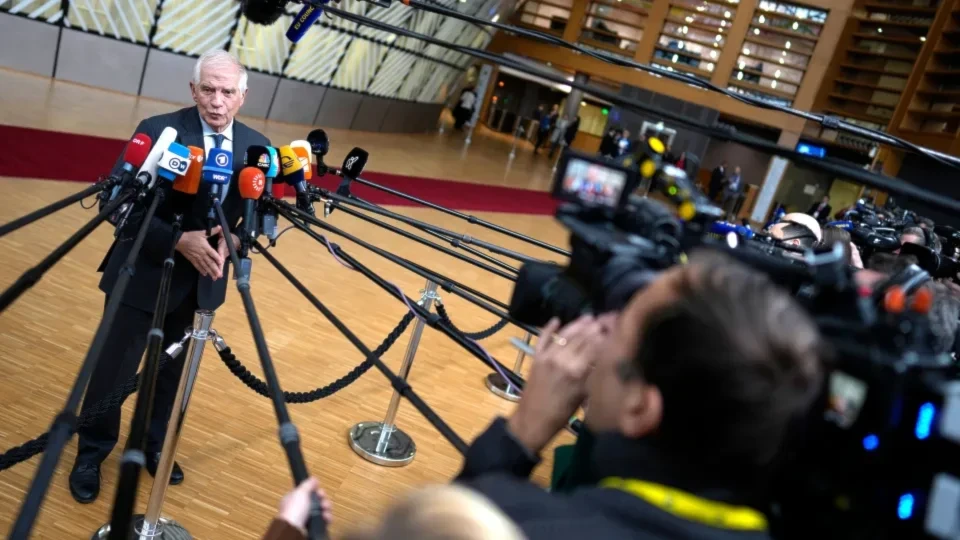EU approves membership talks with Ukraine, Moldova
Hungarian Prime Minister Viktor Orban stands alone as the sole dissenting voice during the summit, which occurred at a crucial juncture for Ukraine.
-

European Union foreign policy Chief Josep Borrell speaks with the media as he arrives for an EU summit at the European Council building in Brussels, Thursday, Dec. 14, 2023. (AP)
European Union leaders, during a summit in Brussels, Belgium, have approved the initiation of formal membership negotiations with Ukraine.
Additionally, Moldova is also under consideration for beginning accession talks aimed at securing EU membership. The decision, made on Thursday and attended by leaders from all 27 EU countries, was reached after the departure of Hungarian Prime Minister Viktor Orban from the room, ensuring a unanimous agreement to commence accession talks with Ukraine and Moldova.
Previously, Hungary had issued a veto threat against Ukraine's EU accession.
Starting accession negotiations with #Ukraine is a bad decision. Hungary did not participate in the decision. pic.twitter.com/omYLSxefkI
— Orbán Viktor (@PM_ViktorOrban) December 14, 2023
“Hungary does not want to be part of this bad decision!” Orban said in a post on Facebook.
European Council President Charles Michel labeled the decision “a clear signal of hope for their people and our continent.”
Orban stood alone as the sole dissenting voice during the summit, which occurred at a crucial juncture for Ukraine.
Simultaneously, Ukrainian President Volodymyr Zelensky rushed to greet the decision as “a victory for Ukraine. A victory for all of Europe.”
This is a victory for Ukraine. A victory for all of Europe. A victory that motivates, inspires, and strengthens. https://t.co/zk44CeL5Ui
— Volodymyr Zelenskyy / Володимир Зеленський (@ZelenskyyUa) December 14, 2023
“A victory that motivates, inspires, and strengthens,” Zelensky said.
In February 2022, Ukraine and Moldova submitted applications for EU membership. Subsequently, at an EU summit in Brussels on June 23, 2022, both nations were awarded candidate status.
The big picture
The move comes at a crucial time for Kiev, which is facing uncertainty regarding future financial assistance from the United States and Europe.
US President Joe Biden has pledged to send an additional $200 million in aid to Ukraine, as discussed in a meeting with Zelensky on Tuesday after Congress Republicans blocked a bill to send military aid worth almost $60 billion to Kiev.
Republicans are more openly rejecting the need to fund Ukraine, saying that Biden needs to devote more attention to domestic security, particularly to stopping illegal migration over the US-Mexican border.
Conservatives insisted on linking their approval of the package for these close foreign allies to Democrats and the White House agreeing to comprehensive immigration reforms. As per recent and popular demands, it is very unlikely that the House will pass any aid to Ukraine unless packaged with funds to secure the US-Mexican border.
Moreover, it was noted that Zelensky must also strategize clearly, as funds were perceived to be sent to a battle that did not yield the anticipated results. Republicans have also questioned whether Ukraine should keep fighting at all.
It is worth noting that Biden's allocation of $200 million in aid does not rely on Congress' approval, instead, the Presidential Drawdown Authority (PDA) will be supplying Kiev with US stock weaponry for the 44th time since the war began.
Read next: Without US support, Ukraine stands no chance in war: Ukrainian MP

 3 Min Read
3 Min Read








